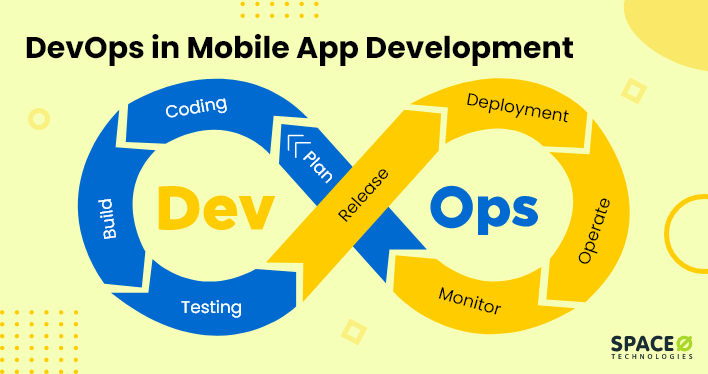If you are planning to learn what DevOps is and its role in app development, you are getting towards a bigger opportunity.
Reason?
Leveraging the DevOps approach, you improve team collaboration and facilitate tight integration. In fact, this is the reason many entrepreneurs are adopting this strategy in mobile app development, as the global market size for DevOps is estimated to reach USD 14.9 billion by 2028.
First, what is DevOps?
DevOps is a set of practices that involve software development (Dev) and IT operations (Ops) with an aim to shorten the app life cycle to offer optimum results.
Development + Operations = DevOps
Being a leading web and mobile app development company, we have decided to curate this complete guide that throws light on the adoption of DevOps in mobile app development.
Let’s get started.
Table of Contents
3 Steps to Apply DevOps in Mobile App Development
If you are planning to adopt DevOps to build mobile apps for your business, then you need to follow the 3 fundamental steps. Check this section to learn more about these steps in detail.
Make Continuous Planning and Integration to Finalise the Project Scope
To make effective planning and integration it is essential to form an effective mobile apps development team structure. That includes developers, project managers, operational heads and stockholders, all of whom will come together and finalize the scope of the project and decide on the launch plan.
On the other hand, the workflow of DevOps is designed in a way that helps one team to write code that can be seamlessly integrated with the code written by the other teams. Along with this, mobile app developers also need to ensure that all the development assets, such as text files, scripts, documents, configuration, and code, can be traceable whenever needed.
In addition, you must also ensure that continuous delivery of the project milestones is taking place on a timely basis, along with continuous integration. This will help you track the progress of the project and determine the launching date. Also, to get help in your app development planning, you can book mobile development consulting service as well.
Monitor Mobile App Testing to Check the App Performance
Continuous testing plays one of the crucial factors that determine the success of the mobile app. However, conducting test include a wide range of mobile devices where the quality analyst team will need to run simultaneously to check the performance of the app.
The team needs to consider:
- The devices’ resolution
- The screen size of the mobile
- Features and functionalities
- Capabilities of the app
Therefore, it becomes really essential that the team carries out tests not only on simulators and emulators but on the real environment where the mobile applications will work.
As mobile apps may fail in the live environment because of various reasons, such as network conditions, power, and memory, developers need to monitor continuous testing of the app by adding third-party SDKs. This will help them to identify the root cause of the failure, such as logs, crash reports, bugs, and so on.
Meanwhile, the automated testing process will help you handle frequent builds, find bugs, and solve complex problems. For detailed steps you can refer to our post on mobile app testing checklist.
Quality Control + Delivery and Deployment
The operations and development teams need to measure and validate all the written codes for the app from the beginning to delivery, including reviewing each change that was applied in the different mobile app development stages.
Continuous deployment takes place once the delivery is completed. In this process, all the changes that are approved by continuous testing get automatically deployed to the live environment.
Also, being an owner of the app, you need to constantly monitor the reviews and ratings received in the app stores. This will help you identify the challenges in mobile app development. Also, you will be able to understand the issues faced by the app users and come up with future enhancements and changes for the app.
Have a Mobile App Idea?
Validate your mobile app idea by consulting us. Being a leading mobile app development company, we have experience developing apps for different industries.

If you are impressed with DevOps already but don’t know its benefits yet, then read the next section. We have discussed all the significant benefits of DevOps in detail.
What are the Advantages of Using DevOps in Mobile App Development?
Despite being a challenging and complex process, mobile DevOps comes with a lot of benefits. Check how implementing mobile DevOps will help you leverage the following benefits.
DeveOps Offers the Best Customer Experience
With DevOps, it becomes easy to build a high-quality product that lures your customers. Through continuous automated testing, you are able to identify the root cause of failures and resolve issues early on so that you can track mobile app KPIs and performance to perform overall app management.
Being an entrepreneur, you also look to enhance the performance of your app. If so, then DevOps is the real asset. Also, if your app is able to maintain a good rating, then there is a high chance that the visibility of your app on the app stores automatically increases.
In short, DevOps lets you test your product continuously and enhance its quality. Moreover, increasing the test speed also allows you to be faster on the market and deliver high-end services to your users in the shortest time.
In fact, being a leading mobile application development company, we also endeavor to build apps that help our clients to be faster on the market and boost sales. One of our developed apps, Glovo, has received total funding of $1.2 billion from 32 investors and has been downloaded by 30+ million users. If you want to read more about Glovo, then take a sneak peek at its portfolio.
DevOps Helps You Deliver App Solution in Less Time
If you want to enter the market and succeed, then you need a unique idea or concept for your product. Innovation is only possible if you can respond quickly to your target audience and rapidly growing market.
You wouldn’t want somebody else to make a product with a similar idea that you have and gain a competitive edge before you can make it. However, using DevOps practices, you easily test your ideas and are able to release a quality product in less time.
DevOps for mobile app development ensures that the app development team is able to deliver high-end mobile app solutions that are thoroughly tested in the live environment and meet the needs of the app users.
DeveOps Helps You Get the Best Quality App Solution
The main reason behind using DevOps is to ensure faster development with regular releases so that you get the best quality software without any compromises.
In case you use agile methodology along with DevOps, you are able to ensure continuous performance monitoring.
With DevOps, you are closely monitoring the performance of your app. You ensure whether the app is able to respond well to the user’s requests or not, and this is how your scrutiny leads to making robust and stable software.
DevOps Helps You Reduce App Development Risks
Using DevOps in app development means you frequently welcome changes in the mobile app development lifecycle. And if there are changes in the software development process, you will test the functionalities before the app’s release to the customers.
This automatically helps you to reduce potential risks as the testing phase will eliminate the identified bugs from the app and fix issues before its release.
If you know the benefits of DevOps, it is also essential that you know the role of DevOps in app development. You must know how DevOps enhances the whole app development process and helps you build a powerful application.

It is the most downloaded Spanish on-demand delivery app. In fact, the Glovo app has been covered by TechCrunch, Financial Times, and Bloomberg.
The app allows users to place an order to get an item they want and get it delivered to their doorstep.
4 Core Importance of DevOps in Mobile App Development
DevOps has given a new meaning to the development process with development and operational abilities. Before DevOps, a mobile developer used to write complete code and then involve the operational team.
However, with DevOps, the whole app development process has now become efficient and transparent between the teams. Let’s see the role and importance of DevOps.
| Importance of DevOps | Description |
|---|---|
| Continuous Test to Monitor the Performance | Continuous testing leads to identifying issues early on and helps you ensure the quality delivery of the services with the app enhancement. |
| Faster Release Time | The developers and the operational team work together to get the development process done in the shortest time possible. |
| Eliminate Inefficiencies & Bottlenecks | The intention behind using DevOps is to make the whole process transparent and improve communication between the team. |
| Promote Innovation | As it offers automation rooms to the developers, they are able to detect and eliminate issues efficiently. This helps developers to think about implementing a unique feature into the app. |
This was all about the benefits of implementing DevOps in app development. Now, let’s discuss the core Cs of DevOps.
6 Cs of DevOps Adoption
If you are planning to adopt DevOps, then you must know that the following six elements are the core reason behind resulting in high-end results.
| Element | Description |
|---|---|
| Continuous Planning | The planning involves everyone in the team to strategize the roadmap and define the app development scope. |
| Continuous Integration | The team must ensure that the code they are writing is seamlessly integrated with the code written by other teams. |
| Continuous Testing | In this process, you continuously test the product to identify bugs and problems early on and ensure it is fixed then and there. |
| Continuous Monitoring | Developers constantly keep an eye on the performance of the app before its release to identify and resolve issues, if any exist. |
| Continuous Delivery | It ensures that the team is able to deliver updates to the production environment in a timely manner to enhance customer satisfaction. |
| Continuous Deployment | Any code written by the developers passes through certain testing phases and automatically gets released to the production environment. |
Want to Develop a Mobile App Solution?
Talk to us to discuss your app development idea. Get a free chance to talk to our DevOps consultants.
After knowing the 6 Cs, if you are still interested to learn more about DevOps, kindly check the below section where we have answered a few most asked questions.
FAQ About DevOps in Mobile App Development
How does DevOps make mobile app development simple & faster?
The main 3 characteristics of DevOps lets you be faster on the market.
- As the developers and the operational team work together on the app development, the process becomes really fast.
- DevOps lets you be faster with regular releases so that you can implement changes really often.
- You are able to test the product continuously and maintain it if required to fix bugs and crashes with the higher speed, the faster you are faster on the market.
What is the goal of using DevOps in app development process?
The main purpose of implementing DevOps is to speed up the app development process. So, it focuses on the following process steps.
- Breaking down the project into multiple phases
- Creating cross-functional teams to divide the work
- Improving and enhancing the flow of value
How many tools are there in DevOps?
There are various tools that you can use for mobile DevOps. Some of the significant mobile DevOps tools are as follows
- Amazon’s AWS Mobile
- Google Firebase
- Microsoft Visual Studio App Center
Want to Create Your App Solution Using DevOps?
With this guide, you get to know how it is easy to align DevOps with business goals and quick to implement to build a high-end application. If you are also planning to implement this strategy, then this is the right time in this evolving digital landscape.
Get in touch with us if you need help in designing a process for your mobile app development and implementing DevOps. Our tech consultants will help you validate your idea and align this strategy with your vision and business objective.




